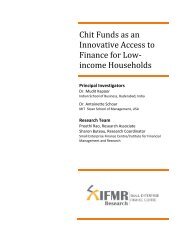Government of India Volume I: Analysis and Recommendations
Government of India Volume I: Analysis and Recommendations
Government of India Volume I: Analysis and Recommendations
Create successful ePaper yourself
Turn your PDF publications into a flip-book with our unique Google optimized e-Paper software.
ANNEXES<br />
14. Regulators must look at compensation policy <strong>and</strong> structure <strong>and</strong> its impact upon<br />
incentives <strong>and</strong> the ability <strong>of</strong> the bank to perform adequate risk management. The<br />
focus <strong>of</strong> supervisors should be upon the incentive implications <strong>of</strong> the compensation<br />
structure. There is a case for rules that require compensation to be spread<br />
over longer horizon, with provisions for claw back <strong>of</strong> payments in certain cases.<br />
While there is some thinking on framework for compensation in private <strong>and</strong> foreign<br />
banks, the same needs to be extended to PSBs. The legal <strong>and</strong> regulatory framework<br />
for compensation should give the BOD <strong>and</strong> shareholders the ability to push PSBs<br />
towards more rational compensation structures, given the deep links between the<br />
problems <strong>of</strong> risk management, operational controls <strong>of</strong> PSBs, <strong>and</strong> the flaws <strong>of</strong> compensation<br />
structure.<br />
15. The notion <strong>of</strong> fit <strong>and</strong> proper for the boards <strong>of</strong> banks needs to be reviewed. The WG<br />
recommends removing the restriction on directors on Boards <strong>of</strong> banks also being<br />
directors <strong>of</strong> other enterprises. However, the Managing Director (MD) would not be<br />
allowed to occupy a board position in group companies/entities.<br />
16. Further, this WG recommends that Section 20(1)(b) <strong>of</strong> the BR Act, which places restrictions<br />
on loans <strong>and</strong> advances by the BOD, must be confined to only loans <strong>and</strong><br />
advances made to private limited companies or to entities where the director has<br />
substantial interest. For the purposes <strong>of</strong> this recommendation, the entities in which<br />
the director is deemed to be substantially interested must be in line with st<strong>and</strong>ards<br />
used for related party transactions under the Companies Act <strong>and</strong> accounting st<strong>and</strong>ards.<br />
This recommendation is broadly in line with the recommendations <strong>of</strong> the<br />
Committee on Financial Sector Assessment (CFSA) (2009). Referring to the definition<br />
<strong>of</strong> “substantial interest” in Section 5(ne) <strong>of</strong> the BR Act, the CFSA was <strong>of</strong> the view<br />
that,<br />
“this quantitative stipulation (Rs. 5 lakhs or 10% <strong>of</strong> the paid up capital<br />
<strong>of</strong> a company) has proved to be very low because <strong>of</strong> inflation <strong>and</strong> also<br />
growth in size <strong>of</strong> banking companies. It is felt that the quantitative ceiling<br />
<strong>of</strong> Rs. 5 lakhs should be removed <strong>and</strong> an appropriate percent <strong>of</strong> the paidup<br />
capital be stipulated”<br />
Hence the definition <strong>of</strong> substantial interest needs to be revised upwards.<br />
17. With respect to PSBs, the BOD, must be given greater powers to nominate members<br />
<strong>of</strong> the appointment committee <strong>and</strong> the compensation committee <strong>of</strong> the BOD.<br />
18. On governance arrangements, the WG recommends that uniform rule <strong>of</strong> law must<br />
be followed by banks irrespective <strong>of</strong> ownership. This includes:<br />
(a) Separating the position <strong>of</strong> chairman <strong>and</strong> managing director in case <strong>of</strong> PSBs as<br />
well.<br />
(b) BODs <strong>of</strong> PSBs must play the same role as any other BOD, with the same stipulations<br />
as any other type <strong>of</strong> bank.<br />
(c) Fully complying with the listing norms (SEBI stock exchange rules) in case <strong>of</strong><br />
listed entities.<br />
19. This WG recommends that the current mode <strong>of</strong> operations <strong>of</strong> banks under Bank<br />
Subsidiary Model (BSM) is inadequate <strong>and</strong> there should be a shift towards the FHC<br />
model as a preferred model for financial sector in <strong>India</strong>. The FHC model mitigates<br />
the risks spilling over to the bank from other entities in the group.<br />
20. Subsidiaries <strong>of</strong> banks should only do business that could have been done purely<br />
within the bank. If insurance cannot be done by a bank, it should not be done by<br />
the subsidiary <strong>of</strong> a bank.<br />
21. Further, capital <strong>of</strong> banks should not be allowed to take any risks apart from banking<br />
risks, <strong>and</strong> mechanisms must be put in place through which resources from the<br />
FINANCIAL SECTOR LEGISLATIVE REFORMS COMMISSION 185



